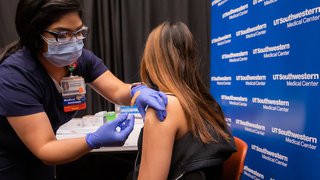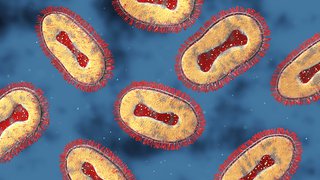More men are dying from COVID-19 – hormones may be partly to blame
August 27, 2020

As a society, we continue to strive for equality among women and men. But science has a way of accentuating some significant biological differences between the sexes.
COVID-19 outcome data from around the world, for example, indicate that men face more severe complications and higher death rates related to the virus than women, even though both genders are infected at a fairly comparable rate.
This could be due behavior or biologic reasons. In part, men have higher levels of ACE2 receptors on their cells, which sit on the surface of the airway in the lungs and have been shown to be an entry point for respiratory viruses such as COVID-19.
In addition, testosterone, which belongs to a class of male hormones called androgens, regulates activation of an enzyme that plays a critical role in priming the SARS-CoV-2 virus for cell entry. Research suggests that before the COVID-19 virus binds with the ACE2 receptor, the enzyme TMPRSS2 (transmembrane protease, serine 2) gives the virus a boost, which makes it easier to enter the body.
In addition, ACE2 receptors are suppressed by estrogens. This combination of effects of androgens and estrogens may, in part, create a biologic disadvantage for men when combating COVID-19.
In other words, men’s higher testosterone and lower estrogen levels may translate to more severe COVID-19 infections. When combined with men’s higher rates of heart disease, hypertension, and diabetes, and detrimental behaviors such as smoking and drinking alcohol, the COVID-19 numbers look grim:
- In 41 of 47 countries, more men than women have died of COVID-19, according to the Centers for Disease Control and Prevention (CDC).
- The fatality rate is approximately 2.4 times higher for men with COVID-19 than it is for women.
Testosterone, estrogen, and inflammation
For years, my lab at UT Southwestern has studied the role of sex hormones on outcomes of respiratory illnesses. We know the female sex hormone, estrogen, appears to fuel a rush of immune cells and inflammatory markers to the lungs that help battle invading bacteria and respiratory viruses, such as influenza or SARS-CoV-2 (COVID-19).

How respiratory illnesses can wreak havoc with your lungs and other vital organs.
Men typically have low levels of estrogen, which means they don't get that spike of acute, protective inflammation, putting them at higher risk for acute infections.
Unfortunately, neither men nor women are protected from potential COVID-19 complications. In severe cases, patients may develop fatal pneumonia or a severe inflammatory response to COVID-19 known as a "cytokine storm." The immune system overreacts to the novel coronavirus, and the excessive inflammation in a patient’s body can cause lasting and sometimes fatal heart, lung, and other organ damage.
UT Southwestern is currently participating in a clinical study sponsored by Genentech to determine whether two drug therapies can effectively treat COVID-19-related pneumonia by targeting inflammation without compromising a patient's immunity against the virus. I am the lead investigator of this UT Southwestern trial.
There are also ongoing studies around the world to determine whether testosterone or estrogen therapy might reduce men's risk of death with COVID-19 infection. However, the use of these therapies for COVID-19 is not yet fully understood, and widespread use is not approved.
For the best protection, men need to understand and control their unique risks for COVID-19. This will be true even when we get an effective vaccine. Research also shows that estrogen may alter vaccine response for other respiratory ailments, such as influenza, where women are thought to develop better immunity. It is possible that a similar phenomenon may occur in response to the COVID-19 vaccine, but this remains to be seen.
Why COVID-19 hits men harder
Studies show that male patients are dying from COVID-19 at a much higher rate than women. Dr. Raksha Jain, a pulmonary specialist whose research focuses on the impact of sex hormones on infections, and Dr. Amit Khera, a preventional cardiologist, uncover some of the biological and behavioral factors that may be putting men at greater risk.
Behavioral and societal risks for men
Behavioral factors
Statistically, men are more likely than women to engage in risky behavior. They also drink alcohol and smoke cigarettes at a higher rate, which contributes to heart and lung problems that increase the risk of COVID-19 complications. Coronary disease, which affects men more often, is also associated with having higher ACE2 levels.
Unfortunately, some men still ascribe to traditional views of masculinity, in which seeking medical care for troubling health symptoms or taking precautions such as wearing a face covering or hand washing may be perceived as a weakness. Toughing it out, particularly when it comes to potentially fatal conditions such as heart and lung disease or COVID-19, is not advised.
Societal factors
Men are more likely than women to work in physical jobs or roles in which they are exposed to toxins that affect the heart and lungs. And more men than women are employed right now. In July 2020, data from the U.S. Bureau of Labor Statistics show the overall unemployment rates for men were lower than for women, even when married with a spouse present. Working outside the home may increase exposure risks.
Finally, men are also less likely to have health insurance or a primary care provider. Having less frequent contact with the health care system can also be a barrier to seeking timely care.
What men can do to reduce their risks
Control underlying health conditions
Heart disease is the No. 1 killer of adults in the U.S. It's also among the many underlying conditions that contribute to severe COVID-19 complications.

For the best outcomes, connect with a doctor and get help to control COVID-19 risk factors, including:
- Asthma
- Chronic obstructive pulmonary disease (COPD)
- Diabetes
- High blood pressure
- Unhealthy relationship with alcohol
- Weight
- Smoking
Researchers are also studying whether taking vitamin C and D supplements may help reduce the risk of COVID-19 complications. These vitamins have been shown to be effective against other acute respiratory illnesses, however there is not enough data yet to draw that conclusion with COVID-19.
Call the doctor's office to get tested at the first sign of COVID-19 symptoms, including:
- Shortness of breath
- Muscle pain
- Low blood pressure
- Sore throat
- Fever or chills
- Cough
- Loss of taste or smell
- Diarrhea or nausea
- Headache
Treatments have improved over the six months of the pandemic. That said, getting care sooner – especially for men, who face the prospect of more severe infections – is key to a healthier recovery and potentially avoiding being put on a ventilator.
Related reading: What you need to know about masks
Take care of yourself
Getting help when you need also helps your family and fellow citizens. We are all facing the threat from the novel coronavirus together. If you don't take precautions – washing your hands, wearing a face covering, practicing social distancing, and avoiding large gatherings – you are not only risking your own health, but the health of your loved ones, friends, and colleagues.

Related reading: How to HALT stress drinking, drug use
Women can play a key role in helping men protect themselves and others, too. A few simple suggestions include exercising together or buying matching masks. Encourage preventive measures, and if your partner or relative is hesitant to seek care, remind them how important their health is to the people around them.
Approximately 87% of countries reporting sex-separated COVID-19 data show more men in all age groups die from the virus, regardless of total number of cases. However, none of us can assume we won't get sick or have a poor outcome.
No matter your age, sex, or fitness level, we all have a role to play in reducing the risks of this pandemic.
If you or a loved one are experiencing COVID-19 symptoms, call 214-645-8300 or request an appointment online.











